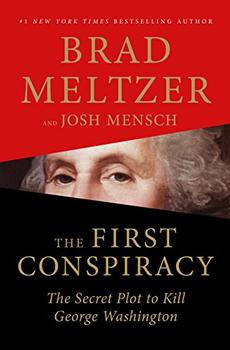Book Club Discussion Questions
Want to participate in our book club? Join BookBrowse and get free books to discuss!
Please be aware that this discussion guide will contain spoilers!
- As the Second Continental Congress met, the authors write that the mood in Philadelphia was "mostly festive" but that the air was also charged with "that unique mix of anticipation and fear that comes with the feeling that the world is about to change." Are you familiar with this type of ambience? During which events in your life have you felt this way?
- The authors state that the question was whether people should be ruled by a monarch who claims divine authority, or if people have the right to choose their own government and therefore rule themselves. Today, to those of us in America, the answer seems obvious, but do you think there are situations when being ruled by a monarch would be preferable?
- The authors state that "the one truth at the core of both the Revolution and America itself [is]…that in our lowest moments, we can find out greatest strengths." What do you think is meant by the phrase? Do you agree? If so, are there modern examples you can point to?
- The authors write, "Tryon believes that in the end, most people will follow strength." Do you think this is true? Why or why not?
- Washington was shocked that those closest to him were spies for Britain. Do you think he was naïve or were people presumed to be more honorable in the 18th century?
- Washington's army faced many challenges in 1775-1776 (weather, smallpox, lack of organization, lack of training, lack of equipment, desertions, illness, spies, etc.) Which do you feel was the most daunting?
- The Continental Congress issued "a secret authorization for the rebel governments in each colony…to kidnap or seize royal officials or private citizens whom they suspect are unfriendly to the American cause." What did you think of this edict? Do you think it was justified?
- Which of Washington's actions mentioned in the book impressed you the most?
- Do you believe the conspirators intended to kill or kidnap Washington? What do you think would have happened had they succeeded in either case?
- The men of Washington's Life Guard were required to be sober and honest; from five feet, eight inches to five feet ten inches in height; handsome and well made; neat and spruce. What did you think of these specifications? Why do you suppose Washington made these stipulations?
- Governor Tryon issued a proclamation that demanded "timely and dutiful submission" of the colonists. The authors write that he "had hoped that his forceful words would embolden the Loyalists in the city and intimidate the rebels," but the plan backfired, resulting in a mob that hanged him in effigy. Why do you think he so misjudged the situation? Was there any other way he could have influenced the population to stay loyal to Britain?
- What did you know about Washington and the time period before reading the book? What new information did you pick up? Was there anything that surprised you?
- Did your opinion of George Washington change as a result of reading this book?
- Washington's letters didn't often refer to God or religion, but he did frequently write about Providence. What do you think is the difference between these? Do you think Providence played a role in the army's ultimate success?
- When Thomas Hickey is charged, it's for sedition, and no mention is made of the plot against Washington. Why do you suppose this was? Do you agree that secrecy was warranted? If the conspiracy was more widely known, what impact would it have had, in your opinion?
- In writing the Declaration of Independence, the political leaders felt they needed to create something for which people would willingly lay down their lives. What do you think is worth fighting for? What is worth dying for? Are United States citizens still willing to do battle for a cause, in your opinion? How are such causes the same today as they were in 1776, and how are they different?
- Were there historical figures mentioned in the book that you would have liked to have learned more about? Was there anything else about the time period you wished the authors had addressed?
- The authors state that Washington "may not have come from wealth, he may not have come from a noble family, but he would always have character." What do you think defines character? What other leaders have had character? Do any of our current leaders possess it, in your opinion?
Created by BookBrowse for our book club forum
Unless otherwise stated, this discussion guide is reprinted with the permission of Flatiron Books. Any page references refer to a USA edition of the book, usually the trade paperback version, and may vary in other editions.
